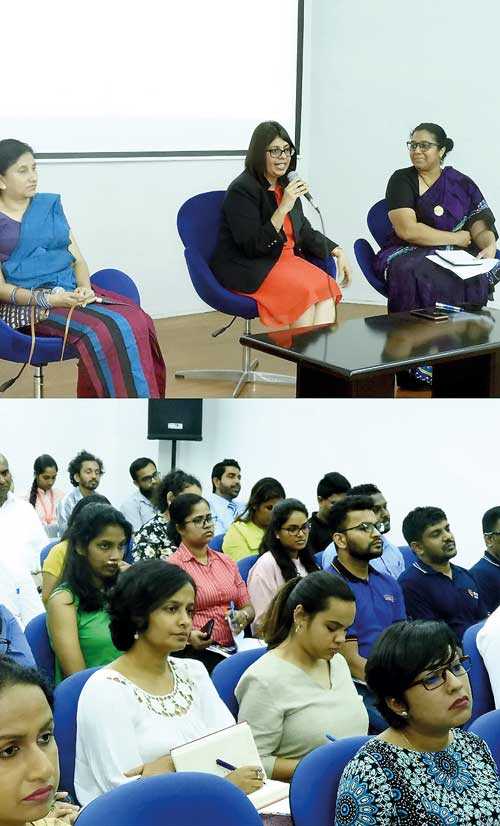Thursday Feb 19, 2026
Thursday Feb 19, 2026
Wednesday, 29 January 2020 00:00 - - {{hitsCtrl.values.hits}}
The first edition of the EFC HR/IR Forum for 2020 powered by Unilever Sri Lanka and Glaxosmithkline Sri Lanka, was held recently on the theme of ‘Diversity and Inclusion- Unconscious Bias’. The keynote address was delivered by Shaweta Pandey, Director Human Resources and Corporate Relations, Unilever Sri Lanka. The HR expert also took the audience through a thought-provoking presentation on the topic, engaging in an interactive session with the participants. Manager, Training and Disability Resource Centre of the Employers’ Network on Disability, The Employers’ Federation of Ceylon (EFC), Manique Gunaratne also shared her experience on the topic.
 As Sondra Thiederman, a leading speaker on workplace diversity notes, achieving diversity and inclusivity at work is ‘through the process of eliminating an inflexible, positive or negative, often unconscious belief about a particular group of people’. Biases at the workplace become barriers in achieving inclusivity and thereby hinder creativity and innovation. The presentation of Unilever Sri Lanka’s HR Director focused on the four main areas of ‘What is unconscious bias’, ‘How does it impact business’, ‘How can one spot bias’ and ‘How can we manage unconscious bias’.
As Sondra Thiederman, a leading speaker on workplace diversity notes, achieving diversity and inclusivity at work is ‘through the process of eliminating an inflexible, positive or negative, often unconscious belief about a particular group of people’. Biases at the workplace become barriers in achieving inclusivity and thereby hinder creativity and innovation. The presentation of Unilever Sri Lanka’s HR Director focused on the four main areas of ‘What is unconscious bias’, ‘How does it impact business’, ‘How can one spot bias’ and ‘How can we manage unconscious bias’.
‘Diversity is being invited to the party, but inclusion is being asked to dance’, set the stage for the topic and Pandey went on to note that while we receive 11 million bits of information every moment, we can only consciously process 40 bits. “Hence most of our decisions are unconscious, however, we can get this unconscious bias to work for us,” remarked the HR specialist who cited age, gender, body language, greetings, alma maters, family status, hidden disabilities, career goals and religious beliefs to be among some of the common factors governing bias. These factors often drive us to form “associations which are uncalled for” she added.
Alluding to the best practices at Unilever’s where there is zero tolerance of discrimination, Pandey reiterated the importance of creating a common platform at workplace devoid of gender bias or otherwise. She went on to note that at recruitment level, what drives her organisation is to find the best candidate irrespective of gender. All these best practices are translated into each layer of the organisation’s working fabric, she added.
Turning a hidden bias into a visible one and retaining our brains and building relationships were cited by Pandey as strategies for managing unconscious bias. ‘Safe bets’ as the HR specialist further noted often fuel unconscious bias. “We are often partial to products of certain schools or prestigious universities and our choices may not be always correct.” Even the so called ‘objective lenses’ very often tend to be laced by unconscious bias, she added. 
Being conscious of bias can help mitigate it, said Pandey further, offering tips in this regard. Asking for behaviour examples without pre-judgment, refraining from accusing fellow colleagues of being biased or prejudiced, asking one’s self if someone else behaving similarly would be assessed the same way, being supportive, being open when someone calls out your own bias, citing factors about unconscious bias and research and ensuring that performance and results of the person being discussed are always part of the conversation, were notable among them.
While changing mindsets, sustaining change, avoiding ‘one-size fits all’ approach and understanding how to differentiate between biases could be challenging, holding everyone accountable including one’s self and others could be the way forward in minimizing unconscious bias, noted Pandey.
Sharing her life’s experience as a visually impaired professional who had experienced prejudice despite her capabilities, Manique Gunaratne urged the organisations to look at a person’s ability rather than the disability. Gunaratne who steers the Training and Disability Resource Centre of the EFC recollected her experience of being given a ‘chance’ by the EFC several years ago to prove what she is capable of. “That one chance changed my whole life,” reflected the globally recognised activist for those with disabilities, encouraging other employers to take a cue from her organisation to shed unconscious bias and focus on the strengths of those with disabilities and nurture them. The session was followed by an interactive segment with the audience.